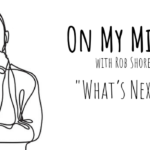What’s the wholesaler formula for success?
In our writing and speaking we have identified it as IQ+EQ+CQ=MQ.
Our guest this week is eminently qualified to help us all improve our EQ.
Anne Loehr is an internationally sought after keynote speaker, writer, consultant, and trainer. She helps leaders in large organizations connect today’s everyday decisions to the future workplace. Her end goal is to help organizations retain their top talent and not only survive, but thrive.
Named the “Generational Guru” by The Washington Post, Anne’s work has been featured in Newsweek International, The Washington Post, The New York Times, National Geographic Traveler, Washingtonian and CNN Money.
She writes for the Huffington Post and Medium, and co-authored 2 management books: A Manager’s Guide to Coaching: Simple and Effective Ways to Get the Best Out of Your Employees and Managing the Unmanageable: How to Motivate Even the Most Unruly Employee.
I was teaching a coaching class to a room full of financial advisors. Coaching skills are one of the hardest management skills to learn, especially for people who work with numbers and facts on a daily basis. Why? Because coaching involves watching for non-verbal cues which can be hard to quantify.
It Was Time To Move On When a Woman in the Back of the Room Said…
After completing an exercise on non-verbal cues, it was clear the group was starting to understand how to watch for, and interpret, non-verbal cues. It was time to move on and teach the next phase of coaching when a woman in the back of room said in a loud, strong voice, “I don’t see how watching someone’s non-verbal cues is going to make me a better advisor.” Every eye turned to me, to see how I was going to handle this woman and her comment.
I Walked Into a Land Mine
I walked into a land mine. We had three more exercises to do in a short period of time, the rest of the group seemed to understand the importance of non-verbal cues and I was irritated that this person had thrown me a curve ball.
What were my options at this point?
- Shame her by saying, “If you had been paying attention to what I had said earlier, you would be able to answer your own question.”
- Ignore the actual question and ask her to talk to me after the session.
- Redo the exercise, despite the fact that the rest of the group seemed to understand the point.
- Use my Emotional Intelligence (EQ).
How Should I Handle This Situation?
As I mentally checked in with myself, I smiled to the group and took a deep breath to help self-manage my emotions. I then said, “Great question! What do others in the room think?” Two people then explained non-verbals from a business perspective, which not only helped the woman who asked the question but also complemented my information for the rest of the group.
Using EQ happens daily, in real-time. Challenging or uncomfortable conversations appear at random times, unexpectedly, at work, at home, in the community and everywhere in between. Your next text message may even require the use of EQ!
Often the conversations that need EQ the most are the messiest ones. Choosing to have the messy conversation, instead of avoiding it, takes courage. But if you are willing to be in uncomfortable territory, you can look at these challenges as an opportunity to build deeper relationships and develop trust.
What is EQ?
What exactly is EQ? EQ is similar to IQ; IQ stands for Intelligence Quotient whereas EQ stands for Emotional Intelligence Quotient. EQ is a measure of your ability to monitor, identify, understand and use emotional information, whether it comes from you or from somebody else. This term became widely known with the publication of Daniel Goleman‘s Emotional Intelligence – Why it can matter more than IQ.
What EQ is Not: Warm and Fuzzy Feelings
Having a high EQ isn’t for promoting warm and fuzzy feelings in the workplace. It is directly related to the bottom line. Pepsi found that executives with high EQs generated 10% more productivity, had 87% less turnover, brought $3.75M more value to the company, and increased ROI by 1000%. L’Oreal found that salespeople with a high EQ sold $2.5M more than others. And when Sheraton decided to incorporate an EQ initiative, their market share grew by 24%.
By now you are probably wondering if your EQ is high or low. While this is by no means exhaustive, here are some qualities associated with high and low EQs:
If you have a high EQ:
- You are able to admit and learn from mistakes
- You can take criticism well
- You stay cool under pressure
- You are able to control your emotions
- You can conduct thoughtful discussions
- You listen at least as much as you talk
If you have a low EQ:
- You often think others don’t get your point
- You feel that being ‘liked’ is over-rated
- You think people over-react to your comments or jokes
- Usually, others are to blame for problems on your team
- You think you shouldn’t be expected to know how colleagues are feeling
Having a high EQ is very nuanced. But the good news is that you can improve your EQ over time with practice. Here are three tips to help you amp up your EQ.
Three Tips to Amp Up Your EQ
1. Practice Responding Instead of Reacting
Can you tell the difference between responding and reacting? The difference is subtle. Reacting is something you do unconsciously when faced with an emotional trigger. Responding is a conscious behavior— you notice how you feel in response to an emotional trigger and then decide how you want to react.
For example, let’s say you’re in a meeting with an advisor that you feel never listens to you. As you begin to share an idea you had for solving a common issue, the advisor interrupts you by speaking over you entirely and explaining her idea. If you react, you may snap at that person. But if you respond, you’d notice that you felt anger and make the decision to calmly tell your client that it is important to you to be able to share your ideas, and you’d love to finish your thought before they began to speak. It’s obvious which outcome will be more favorable.
2. Practice Empathy
Empathy is the ability to understand and share the feelings of another. In working relationships, this is especially important for building trust. If you notice someone being late for meetings, don’t write them off as a bad advisor. Instead, talk to them about the real reason they are running late. If they are willing to share that information with you, try to put yourself in their shoes and understand where they are coming from. Respond to them with understanding. If they aren’t willing to share, think of a time in your own life where you behaved similarly, and examine why. Were you dealing with family issues? Were you feeling unappreciated? Were you not being challenged? Eliminate snap judgments and consciously practice empathy.
3. Listen to Your Body
Does your heart race when advisors walk into the room? Do you have a knot in your stomach when someone mentions DOL? These are messages from your body and you must listen to them. Pay attention to how you feel in various situations. Decide what those feelings mean so that you can respond to them with the powers of reason.
Developing Emotional Intelligence is a Lifelong Practice
In short, you can improve your EQ by practicing active listening, empathy, responding rather than reacting, and listening to your body. But it’s important to remember that developing Emotional Intelligence is a lifelong practice, and there is always room for improvement.
Written by Anne Loehr


 Creating an Influential Advisor Encounter with Michael Hoffman
Creating an Influential Advisor Encounter with Michael Hoffman Wholesaler Follow-up Process: Part Art and Part Science with Chris Dungworth
Wholesaler Follow-up Process: Part Art and Part Science with Chris Dungworth On My Mind: What’s Next?
On My Mind: What’s Next? Be Bold, Be Brief and Be Gone with Jimmy Pomerance
Be Bold, Be Brief and Be Gone with Jimmy Pomerance The Next Crisis Is Always Lurking, Are You Prepared? with Melissa Agnes
The Next Crisis Is Always Lurking, Are You Prepared? with Melissa Agnes